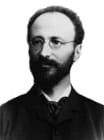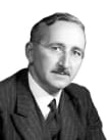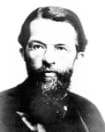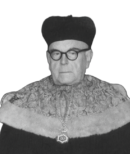Ewald Schams (1889-1955)

Mathematical economic theory, as a theory of relations, has no more possibility of development than geometry. Quite independently of whether there is a stationary reality or simply an economy in complete motion, logically defined statics will remain a presupposition.
TAKE AWAY
Ewald Schams (1889-1955) was an Austrian economist who contributed to advancing research in the Austrian School of Economics. He studied at the University of Graz under Joseph A. Schumpeter, and thus became Schumpeter’s only Austrian student. Well trained in mathematics and the essentially static Lausanne School he worked predominantly on the important issues of methodology, epistemology and economic theory. Sometime after his graduation, Schams moved to Vienna, taught there as an unpaid professor at the University of Technology and worked also as a Sektionsrat (ranking civil servant) mainly in the Ministry of Education. He was a regular and brilliant participant in Ludwig von Mises’ private seminar and several other intellectual circles in Vienna. After Germany annexed Austria in 1938, he remained and adapted to the Nazi regime. Thus he was permitted to resume his teaching not before 1947. Although Schams seems to have published fewer than 15 major essays and several book reviews, his works are important and “small, finely polished gems in the specific literature of the Austrian school” (F.A. von Hayek).
Kurt L. Leube
I
Like Richard von Strigl and Leo Schoenfeld-Illy, Ewald Schams was the third member of that important intermediate generation of Austrian economists who, both in academia, in various intellectual circles and in their respective professions exerted considerable influence in interwar Vienna. These three scholars were in an age range between the 3rd generation (i.a. Mises, Amonn, Schumpeter, Mayer, Weiss, Vleughels, Cronbach, Reisch, Heller, …) and the 4th generation of the Austrian School (i.a. von Haberler, Machlup, von Hayek, Leoni, Shackle, Lachmann, Morgenstern, Robbins, Rosenstein-Rodan, Browne, Lieser, van Sickle, Hazlett, …).
According to Gottfried von Haberler (1900-1995), Martha Steffy Browne (1898-1990) but also to the historian Friedrich Engel von Janosi (1893-1978), Schams’ sharply honed contributions to the methodological discussions in Ludwig von Mises’ private seminar reflected his supreme knowledge in methodology and economic theory. His analyses at times even prompted von Mises (1881-1973) to endorse his objections. And Friedrich A. von Hayek (1899-1992) portrayed Schams as a brilliant participant in the private Mises-Seminar, the so-called ‘Geistkreis’ or the Nationalökonomische Gesellschaft. But Hayek also remembered him as a passionate book collector and a rather laconic, serious and very reserved scholar. It is probably for these reasons that comparatively little is known about Schams’ upbringing, his surroundings and personal life.
II
At any rate, born into a family of teachers on October 17, 1889, Ewald Schams was raised in Graz (A) where he went to school and studied law at the University of Graz. When Joseph A. Schumpeter (1883-1950) was appointed as professor of economics there, Schams studied with him and graduated in 1913 or 1914, thus becoming Schumpeter’s sole Austrian student. Within weeks after the beginning of WWI, he voluntarily joined the kuk Austro-Hungarian Army and was soon promoted to the rank of a platoon leader. He returned from the front prior to the end of WWI, and moved to Vienna, where he befriended Ludwig von Mises (1881-1973), who happened to live virtually next door. In 1919 Schams started working in the newly established Austrian Department of Education and the Federal Chancellery. He married in 1924 and was promoted to Sektionsrat (a ranking civil servant) in 1930. Schams also taught as an unpaid ‘Privatdozent’ economic theory and methodology at Vienna’s University of Technology.
Having been introduced from the outset to the teachings of both, the Lausanne and Austrian schools, he differed from most other fellow economists in Vienna. Due to his unusually comprehensive knowledge not only of the entire body of economic literature, but also of social philosophy, of history and anthropology, Schams was active in several scholarly circles and soon gained high respect. Aside from his participation in L. von Mises’ private seminar between 1924 and 1934 he attended nearly all sessions of the Austrian Economic Society, which was founded by a group of young scholars, including Hans Mayer (1879-1955) and Ludwig von Mises (1881-1973). This society was known as the ‘Nationalökonomische Gesellschaft’ (NOeG) and in 1934 Schams was elected to its board. According to the mathematician Karl Menger ((1902-1985), Carl Menger’s only son, Schams was also a formidable debater in the Wiener Kreis (Vienna Circle), the famous group of philosophers and social scientists who gathered around the German philosopher Moritz Schlick (1882-1936). From the mid 1920s on, Schams began to share his interest in mathematics and game theory with him as well as with Oskar Morgenstern (1902-1977) and also with Paul N. Rosenstein-Rodan (1902-1985).
About 6 years after the end of WWI, the US based Rockefeller Foundation initiated the award of scholarships also to Austrian social scientists and appointed the historian Alfred Francis Pribram (1859-1942) to oversee the selection procedure. These scholarships provided funding for study visits of 1-3 years and one of them afforded Schams to spend the academic year of 1929-1930 first in for a short time in New York (USA) followed by the remainder of his fellowship in Paris (F). Both his two seminal essays “Konstanz und Variabilität ökonomischer Grössenbeziehungen” (1930) and “Komparative Statik” (1930) were written there. These scholarships were also given to Haberler, Morgenstern, Rosenstein-Rodan and Mahr among others. It so happened that at the beginning of Schams’ fellowship stay in Paris, F. A. von Hayek passed through the city, recognized this elegant, taut and officer-like gentleman amid the antiquarian booksellers at the Seine river and acquainted him with one of the Bouquinistes who was specialized in 18th century French economics works. As a kind of compensation Schams read and made careful comments to Hayek’s introduction to the translation of Richard Cantillon’s “Essai sur la nature du commerce en general’ (1755) by Richard Cantillon (1680-1734). According to F.A. von Hayek, the “Essay on the Nature of Trade in General” was an early work on the theory of marginal utility and contributed more “really original insights of permanent value” to economics than any other writer before 1776. After Schams’ unexpected death in 1955, von Hayek acquired his exquisite collection of books by 18th century French and English economists from his widow (who died in 1976) and thus complemented his own unique library of some 27,000 volumes.
The unusually long gap between Schams’ works up to 1935 and 1950, when his last essay on “Der angebliche Zirkelschluss der Preisbildungstheorie” was published, is most likely due to the volatile political situation in Vienna. As most of his colleagues and workmates have left Vienna during the 1930s (only a few remained in Vienna, among them A. Mahr, H. Mayer, L. Schoenfeld-Illy and R. von Strigl), he became intellectually isolated and was left without any inspiration. When the Nazis annexed Austria in March 1938, he came to terms with the new regime, however it seems that Schams and his wife settled into a very private if not secluded life.
When soon after WWII, the Allied Forces occupying Austria initiated the Denazification Process aimed at removing Nazi ideology from government positions and civil life, Schams’ venia legendi (the privilege to lecture) was revoked, and he was only permitted to return to his teaching at Vienna’s University of Technology in the fall of 1947. His position as Sektionsrat was terminated in 1947 and his course on Economics and Technology was reinstated not before 1952.
III
Although Ewald Schams never published a treatise, a major monograph or a textbook, he owes his enduring position in the tradition of the Austrian School primarily to his important contributions to methodology, the history of ideas, and price theory. The strength of his identified essays lay less in the philosophical starting point than in his unique familiarity with the various theoretical schools, especially those of Germany, France and Italy. Although he was naturally also familiar with the English literature, his sympathies seem to have been primarily devoted to continental developments. Regretfully even to date none of his works have been translated.
Schams’ long obituary for Friedrich von Wieser (1851-1926), which was published in 1926 is a literary gem and arguably the most wide-ranging tribute to one of the principal members of the 2nd generation of the Austrian School. In his work on “Zur Geschichte und Beurteilung der exakten Denkformen in den Sozialwissenschaften” (1928), Schams shows the insurmountable difficulties of applied mathematics conducting quantitative measurements in the social sciences because of the dynamic nature of markets and thus of carrying out any computationally precise research. His essay on “Komparative Statik” (1930) was ground-breaking at the time and is among his most significant achievements. He addresses there the futile attempts to dynamize theory in order to reflect the dynamic nature of economic reality and shows that if any movement, i.e. change through time, is introduced to a static theory, the law-like nature of the disproportional movement will destroy the comparison of economic relations. In other words, mathematical calculation can only provide a sort of crutches for men’s inadequately comprehensive thinking. For Schams mathematical economic theory, as a theory of relations, has no more possibility of development than geometry. Together with Oskar Morgenstern, his much younger colleague in Vienna he published the still very useful compilation of works on the general history of economic teaching in 1933.
He returned to the methodologically crucial problem of statics and time in economic theory in another article on “Die Determinierbarkeit des Wirtschaftsgeschehens” (1934) and criticized the econometric approach to theory. For Schams the simultaneity of more than two independent movements in the economy cannot be dealt with mathematically. If a market participant does not proceed from given prices and quantities, and introduces change through time, he/she is faced with the task of dealing with future changes. To put it in another way, one turns one’s back on exact theory and enters the company of some dice-throwing probability theorists.
His last essay on “Der angebliche Zirkelschluss der Preisbildungstheorie” (1950) was his contribution to an academic Festschrift dedicated to Hans Mayer. The supposed circularity of price formation, which states that prices are determined by costs, but prices, in turn, depend on costs, arises because costs are often influenced by the expected market price as entrepreneurs calculate their profit margins based on the price at which they can sell the product. Schams showed that this apparent contradiction is resolved in free markets where the unhampered interplay of supply and demand leads to an equilibrium price.
Aside from his 14 essays and several short but very interesting book reviews there is no other published work by Ewald Schams known. Only a few scribbled notes and fragmentary drafts were found in his estate. He died unexpectedly and largely unnoticed on December 9, 1955 in Vienna.








































